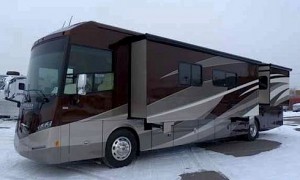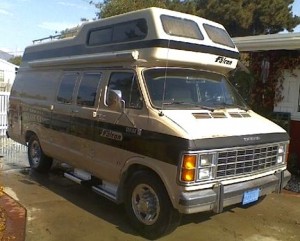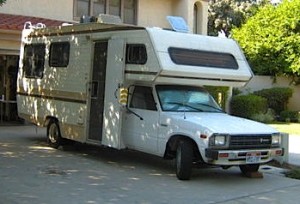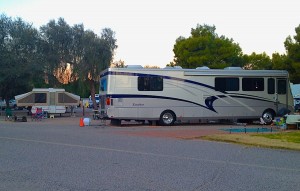Choosing The Right RV For You: Motorhomes
 Motorhomes can range from anything to a van conversion to a massive motor coach. I was shocked the first time I arrived in Quartzsite because I thought only movie stars and musicians toured the country in huge motorhomes, but ordinary people all over this nation own HUGE motorhomes.
Motorhomes can range from anything to a van conversion to a massive motor coach. I was shocked the first time I arrived in Quartzsite because I thought only movie stars and musicians toured the country in huge motorhomes, but ordinary people all over this nation own HUGE motorhomes.
Cost
I’ve seen motorhomes in our classifieds for as low as $3,000, but they seldom have a running engine at that price. I appears that you have to spend at least $5,000 to get one that runs and more if you want any hope of it continuing to run. The new motorhomes are HORRENDOUSLY expensive with prices in the $200,000 to $500,000 range. I’ve even seen them as high as $1,000,000.
Fortunately, that’s where the expense ends. You don’t need a heavy-duty tow vehicle because a motorhome HAS an engine. You might want to tow your car behind the huge motorhome, which might cost you in the gear to make that happen, but once you’ve bought your motorhome and it runs properly, you don’t need another vehicle.
If you are a brilliant mechanic, then the thought of an old motorhome probably doesn’t frighten you, but to me, it’s terrifying. I much prefer to have my camping in a vehicle that doesn’t have an engine attached. Then, I can change my tow vehicle when the engine fails or change the camping vehicle when it gets old, leaky or worn out. I prefer my RVs to be interchangeable that way.
Storage
 Just like a travel trailer and fifth-wheel, a motorhome would need a large piece of land for storage or a spot at an RV facility for $100-$120 a month. Very few motorhomes would fit under the low door clearances of a garage, not even this van conversion motorhome.
Just like a travel trailer and fifth-wheel, a motorhome would need a large piece of land for storage or a spot at an RV facility for $100-$120 a month. Very few motorhomes would fit under the low door clearances of a garage, not even this van conversion motorhome.
Mileage
This is the worst of them all. Last year, at Quartzsite, I asked what mileage those big motorcoaches got and not one person answered higher than 7 mpg. The lowest was 2 mpg, but he had a glint in his eye when he told me and I don’t know if he was pulling my leg or not. The smaller motorhomes can get 12-15 mpg regularly, but you really have to watch the weight in your coach, drive 55 mph and keep your engine fine-tuned to get that good of mileage.
Capacity
 Motorhome sleeping capacity is as vast as the sizes of motorhomes. The tiny vans usually only sleep two, whereas this tiny Toyota Dolphin Motorhome can sleep six. The huge motorcoaches can sleep as many people as the biggest of the tent trailers.
Motorhome sleeping capacity is as vast as the sizes of motorhomes. The tiny vans usually only sleep two, whereas this tiny Toyota Dolphin Motorhome can sleep six. The huge motorcoaches can sleep as many people as the biggest of the tent trailers.
Comfort
Just as with the sleeping capacity, the comfort levels can be spartan or luxurious. Most motorhomes have propane heaters. Some of them even have A/C. Since they are all hard-sided, they will definitely be warmer to sleep in than tent trailers, so those cold nights in the Utah mountains will be easily slept through in a motorhome.
Additionally, you have the comforts of your motorhome while you’re driving. Your spouse or children can wander the motorhome, getting food, playing with their toys or even sleeping while you drive. If you’re stuck in traffic, you can even switch drivers quickly. And the luxury of a restroom onboard would allow for fewer stops along the way if you didn’t have to refill the gas tank so often.
Effort
I imagine that setting up a motorhome at the campsite would be the easiest of all, especially if you’re not towing an additional vehicle behind you. I would think that parking and leveling would be all that you needed before you could drop into your pre-made bed to sleep.
Restrooms
The small van conversions might not have restrooms, but even some of them have them. I love the thought of having a restroom in a motorhome. I imagine Mike would be driving and I could just get out of my seat and use the bathroom while we were still going. It’s a luxury I can’t stop thinking about when considering a motorhome.
Safety
I have NO idea how people drive these huge motorhomes. We don’t hear about motorhomes getting blown over by huge winds on I-15 every year, but they do get into accidents quite frequently. I can’t even fathom how to drive them, but here is a video about how to drive.
I’m more partial to the smaller RVs just because I imagine they’d be easier to drive, but I really have no experience with them.
Campsite Availability
Just like with the travel trailers and fifth-wheels, there are some campsites in our national and state parks that are too short for the longest of the motorhomes. You’ll be safe as long as your motorhome is less than 25 feet, but most sites can accommodate motorhomes that are 25 feet or less.
 If you are in a luxury motorcoach, you won’t have any problems with elitism at luxury RV resorts like I have with my tiny tent trailer. I suspect if I had a tiny Toyota Dolphin motorhome, however, the people at that luxury resort would have put me in the back with tent trailers.
If you are in a luxury motorcoach, you won’t have any problems with elitism at luxury RV resorts like I have with my tiny tent trailer. I suspect if I had a tiny Toyota Dolphin motorhome, however, the people at that luxury resort would have put me in the back with tent trailers.
Weirdness
Depending on your motorhome, you might attract a crowd. I suspect that the older your motorhome is, the more likely you are to have strangers come to your campsite to talk to you and ask to see the inside.
The Walmart Factor
The Walmart overnight parking benefits were MADE for motorhomes. They expect you to have engine trouble and need parts at their store and they would love you to stay there and spend your money. One note, however, is that it’s polite to not put down your stabilizers and leveling jacks.
Conclusion
I’ve never owned a motorhome, so my viewpoint might be a little off on these RVs. They may be harder to set up or easier to drive than I imagined. I’d be interested in using one for a few months to see how that would change my viewpoint, but at this juncture, it’s just not within my price range.
Here are links to the other entries in this series:
- 01-25-13 – Choosing The Right RV For You: Your Car
- 01-26-13 – Choosing The Right RV For You: Teardrop Campers
- 01-27-13 – Choosing The Right RV For You: Tent Trailers
- 01-28-13 – Choosing The Right RV For You: Truck Campers
- 01-29-13 – Choosing The Right RV For You: Bumper Pull Travel Trailers
- 01-30-13 – Choosing The Right RV For You: A-Frame Campers
- 01-31-13 – Choosing The Right RV For You: Fifth Wheel Trailers
- 02-01-13 – Choosing The Right RV For You: Motorhomes